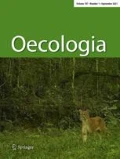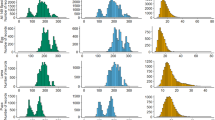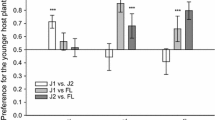Abstract
Maternal condition can generate resource-related maternal effects through differential egg provisioning that can negatively affect offspring performance especially when offspring growth occurs in stressful or sub-optimal environments. Using the Speckled Wood butterfly, Pararge aegeria (L.) we tested the hypothesis that repeated periods of intensive flight during female oviposition affects egg provisioning and reduces offspring performance when larval development occurs under stressful conditions on drought stressed host plants. We investigated whether (after controlling for egg size) maternal age and flight treatment resulted in changes in egg provisioning and whether this contributed to variation in offspring traits across life stages. Age-related changes in maternal condition were found to generate resource-related maternal effects that influenced offspring traits across all life stages. Flight-induced changes in maternal egg provisioning were found to have direct consequences for offspring development in the egg and larval stages. There were significant interactive effects between maternal age and flight on larval development and growth. Compared to offspring from forced flight mothers, offspring from control (no forced flight) mothers that hatched from eggs laid early in the oviposition period (i.e. by younger mothers) had shorter larval development times and heavier pupal masses, suggesting that offspring from mothers in relatively good condition may be able to buffer some of the costs associated with growth on drought stressed host plants. Our multi-factor study demonstrates the importance of considering the various, and often interacting, mechanisms by which maternal effects may influence offspring performance in stressful environments.


Similar content being viewed by others
References
Abramoff MD, Magalhaes PJ, Ram SJ (2004) Image processing with ImageJ. Biophoton Int 11:36–42
Awmack CS, Leather SR (2002) Host plant quality and fecundity in herbivorous insects. Annu Rev Entomol 47:817–844. https://doi.org/10.1146/annurev.ento.47.091201.145300
Bauerfeind SS, Fischer K (2008) Maternal body size as a morphological constraint on egg size and fecundity in butterflies. Basic Appl Ecol 9:443–451. https://doi.org/10.1016/j.baae.2007.05.005
Begon M, Parker GA (1986) Should egg size and clutch size decrease with age? Oikos 47:293–302
Bernardo J (1996) Maternal effects in animal ecology. Am Zool 36(2):83–105
Berwaerts K, Van Dyck H, Aerts P (2002) Does flight morphology relate to flight performance? An experimental test with the butterfly Pararge aegeria. Funct Ecol 16:484–491
Berwaerts K, Matthysen E, Van Dyck H (2008) Take-off flight performance in the butterfly Pararge aegeria relative to sex and morphology: a quantitative genetic assessment. Evolution 62(10):2525–2533
Bitume EV, Bonte D, Ronce O, Olivieri I, Nieberding CM (2014) Dispersal distance is influenced by parental and grand-parental density. Proc R Soc B Biol Sci. https://doi.org/10.1098/rspb.2014.1061
Bonte D et al (2012) Costs of dispersal. Biol Rev 87:290–312. https://doi.org/10.1111/j.1469-185X.2011.00201.x
Carhenzli F, Erhardt A (2013) Transgenerational acclimatization in a herbivore-host plant relationship. Proc R Soc B Biol Sci 280:20122856. https://doi.org/10.1098/rspb.2012.2856
Carroll AL, Quiring DT (1993) Interactions between size and temperature influence fecundity and longevity of a tortricid moth, Zeiraphera canadensis. Oecologia 93:233–241
Cory JS, Goulson D (1993) Flower constancy and learning in foraging preferences of the green veined butterfly Pieris napi. Ecol Entomol 18:315–320. https://doi.org/10.1111/j.1365-2311.1993.tb01107.x
Dover J, Sparks T (2000) A review of the ecology of butterflies in British hedgerows. J Environ Manag 60:51–63. https://doi.org/10.1006/jema.2000.0361
Ezard THG, Prizak R, Hoyle RB (2014) The fitness costs of adaptation via phenotypic plasticity and maternal effects. Funct Ecol 28:693–701. https://doi.org/10.1111/1365-2435.12207
Gibbs M, Van Dyck H (2009) Reproductive plasticity, oviposition site selection, and maternal effects in fragmented landscapes. Behav Ecol Sociobiol 64:1–11. https://doi.org/10.1007/s00265-009-0849-8
Gibbs M, Van Dyck H (2010) Butterfly flight activity affects reproductive performance and longevity relative to landscape structure. Oecologia 163:341–350. https://doi.org/10.1007/s00442-010-1613-5
Gibbs M, Lace LA, Jones BC, Moore AJ (2005) Egg size-number trade-off and a decline in oviposition site choice quality: female Pararge aegeria butterflies pay a cost of having males present at oviposition. J Insect Sci 5:39. https://doi.org/10.1673/1536-2442(2005)5[1:ESTAAD]2.0.CO;2
Gibbs M, Breuker CJ, Hesketh H, Hails R, Van Dyck H (2010a) Maternal effects, flight versus fecundity trade-offs, and offspring immune defence in the Speckled Wood butterfly, Pararge aegeria. BMC Evol Biol 10:345. https://doi.org/10.1186/1471-2148-10-345
Gibbs M, Breuker CJ, Van Dyck H (2010b) Flight during oviposition reduces maternal egg provisioning and influences offspring development in Pararge aegeria (L.). Physiol Entomol 35:29–39. https://doi.org/10.1111/j.1365-3032.2009.00706.x
Gibbs M, Van Dyck H, Karlsson B (2010c) Reproductive plasticity, ovarian dynamics and maternal effects in response to temperature and flight in Pararge aegeria. J Insect Physiol 56:1275–1283. https://doi.org/10.1016/j.jinsphys.2010.04.00
Gibbs M, Van Dyck H, Breuker CJ (2012) Development on drought-stressed host plants affects life history, flight morphology and reproductive output relative to landscape structure. Evol Appl 5:66–75. https://doi.org/10.1111/j.1752-4571.2011.00209.x
Guillaume AS, Monro K, Marshal DJ (2016) Transgenerational plasticity and environmental stress: do paternal effects act as a conduit or a buffer? Funct Ecol 30:1175–1184. https://doi.org/10.1111/1365-2435.12604
Hughes CL, Hill JK, Dytham C (2003) Evolutionary trade-offs between reproduction and dispersal in populations at expanding range boundaries. Proc R Soc Lond Ser B Biol Sci 270:S147–S150. https://doi.org/10.1098/rsbl.2003.0049
IPCC (2014) Climate change 2014: synthesis report. In: Pachauri RK, Meyer LA (eds) Contribution of working groups I, II and III to the fifth assessment report of the intergovernmental panel on climate change. IPCC, Geneva, p 151
Johnson CG (1969) Migration and dispersal of insects by flight. Methuen, London
Karlsson B, Wiklund C (1984) Egg weight variation and lack of correlation between egg weight and offspring fitness in the wall brown butterfly Lasiommata megera. Oikos 43:376–385
Karlsson B, Wiklund C (1985) Egg weight variation in relation to egg mortality and starvation endurance of newly hatched larvae in some satyrid butterflies. Ecol Entomol 10:205–211
Kuijper B, Hoyle RB (2015) When to rely on maternal effects and when on phenotypic plasticity? Evolution 69–4:950–968. https://doi.org/10.1111/evo.12635
Kuijper B, Johnstone RA, Townley S (2014) The evolution of multivariate maternal effects. PLoS Comput Biol 10(4):e1003550. https://doi.org/10.1371/journal.pcbi.1003550
Marshall DJ, Uller T (2007) When is a maternal effect adaptive? Oikos 116:1957–1963
Merckx T, Van Dyck H, Karlsson B, Leimar O (2003) The evolution of movements and behaviour at boundaries in different landscapes: a common arena experiment with butterflies. Proc R Soc Lond Ser B Biol Sci 270:1815–1821. https://doi.org/10.1098/rspb.2003.2459
Oliver TH, Marshall HH, Morecroft MD, Brereton T, Prudhomme C, Huntingford C (2015) Interacting effects of climate change and habitat fragmentation on drought-sensitive butterflies. Nat Clim Change 5:941–945. https://doi.org/10.1038/nclimate2746
Pollard E (1988) Temperature, rainfall and butterfly numbers. J Appl Ecol 25:819–828
Schweiger O, Dormann CF, Bailey D, Frenzel M (2006) Occurrence pattern of Pararge aegeria (Lepidoptera: Nymphalidae) with respect to local habitat suitability, climate and landscape structure. Landsc Ecol 21:989–1001
Shreeve TG (1986) Egg laying by the speckled wood butterfly (Pararge aegeria)—the role of female behavior, host plant abundance and temperature. Ecol Entomol 11:229–236. https://doi.org/10.1111/j.1365-2311.1986.tb00298
Talloen W, van Dyck H, Lens L (2004) The cost of melanization: butterfly wing coloration under environmental stress. Evolution 58:360–366. https://doi.org/10.1554/03-250
Uller T (2008) Developmental plasticity and the evolution of parental effects. Trends Ecol Evol 23:432–438. https://doi.org/10.1016/j.tree.2008.04.005
Uller T, Nakagawa S, English S (2013) Weak evidence for anticipatory parental effects in plants and animals. J Evol Biol 26:2161–2170. https://doi.org/10.1111/jeb.12212
Van Dyck H (2003) Mate location, a matter of design? Adaptive morphological variation in the speckled wood butterfly. In: Boggs CL, Watt WB, Ehrlich PR (eds) Butterflies: ecology and evolution taking flight. University of Chicago Press, Chicago, pp 353–366
Van Dyck H, Baguette M (2005) Dispersal behaviour in fragmented landscapes: routine or special movements? Basic Appl Ecol 6:535–545. https://doi.org/10.1016/j.baae.2005.03.005
Vande Velde L, Van Dyck H (2013) Lipid economy, flight activity and reproductive behaviour in the speckled wood butterfly: on the energetic cost of territory holding. Oikos 122:555–562
Vande Velde L, Schtickzelle N, Van Dyck H (2013) Effect of larval food stress on male adult behaviour, morphology and reproductive investment in the butterfly Pararge aegeria. Evol Ecol 27:221–234. https://doi.org/10.1007/s10682-012-9580-4
Wickman P-O, Wiklund C, Karlsson B (1990) Comparative phenology of four satyrine butterflies inhabiting dry grasslands in Sweden. Holarct Ecol 13:238–346
Wiklund C, Karlsson B (1984) Egg size variation in Satyrid butterflies—adaptive vs historical, “Bauplan”, and mechanistic explanations. Oikos 43:391–400
Wiklund C, Persson A (1983) Fecundity, and the relation of egg weight variation to offspring fitness in the Speckled Wood butterfly, Pararge aegeria, or why don’t butterfly females lay more eggs? Oikos 40:53–63. https://doi.org/10.2307/3544198
Woestmann L, Saastamoinen M (2016) The importance of trans-generational effects in Lepidoptera. Curr Zool 62(5):489–499. https://doi.org/10.1093/cz/zow029
Acknowledgements
Hubert Baltus helped with the butterfly rearing. Jeremie Tomlin helped with egg measurements. Michel Pirnay, Jean-Pierre Motte and Marc Migon provided technical assistance. This article is publication number BRCxx of the Biodiversity Research Centre (ELIB) of the UCL. This research comprises work funded under the NC research project ‘Ecological processes and resilience’ (NEC05106, Task 2) to MG and ARC research Grant 10-15/031 (UCL) and FNRS research Grant PDR T.0188.14 to HVD.
Author information
Authors and Affiliations
Contributions
MG originally formulated the idea with input from HVD. MG designed and executed the study. MG and CJB performed statistical analyses. MG, HVD and CJB wrote the manuscript.
Corresponding author
Ethics declarations
Conflict of interest
The authors declare that they have no conflict of interest.
Data accessibility
Data from this study are available for download from the NERC Environmental Information Data Centre: (unique DOI to be provided on publication).
Additional information
Communicated by Konrad Fiedler.
Rights and permissions
About this article
Cite this article
Gibbs, M., Van Dyck, H. & Breuker, C.J. Flight-induced transgenerational maternal effects influence butterfly offspring performance during times of drought. Oecologia 186, 383–391 (2018). https://doi.org/10.1007/s00442-017-4030-1
Received:
Accepted:
Published:
Issue Date:
DOI: https://doi.org/10.1007/s00442-017-4030-1




